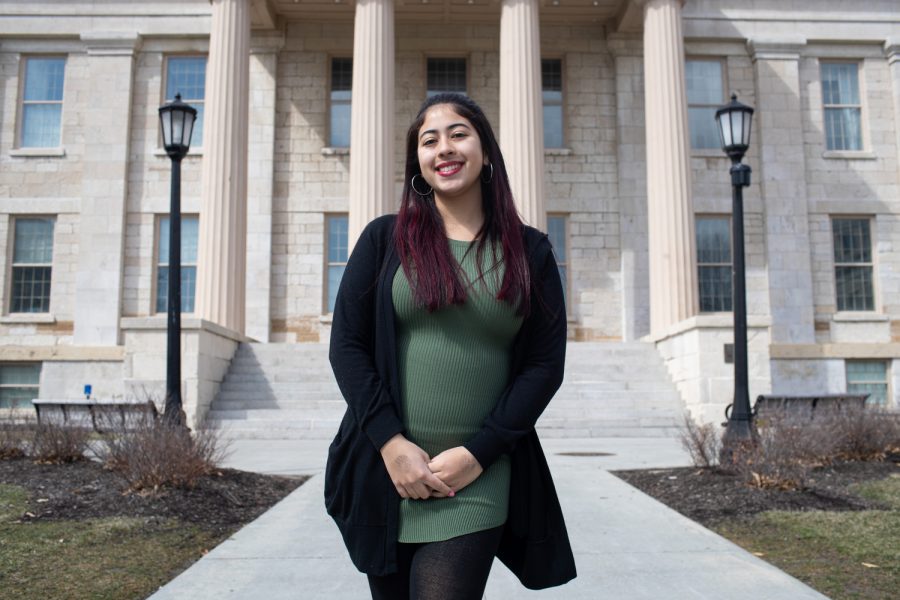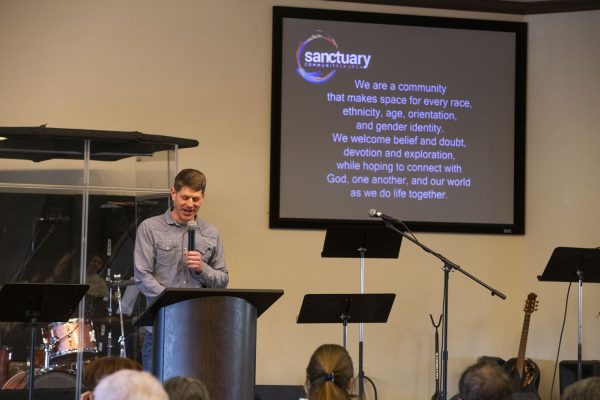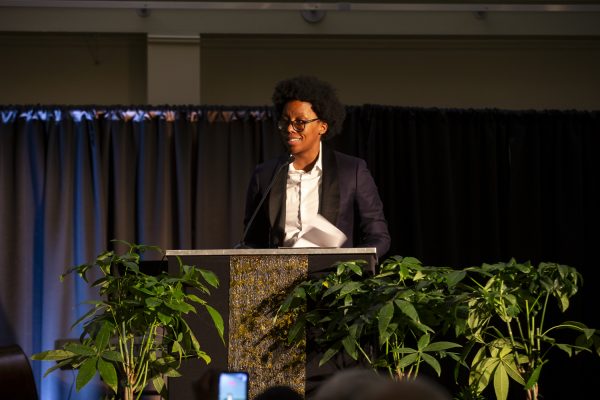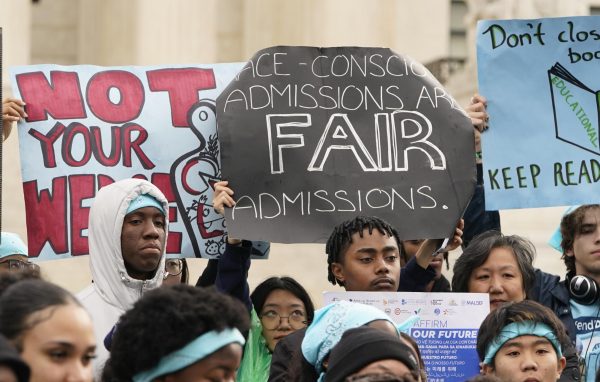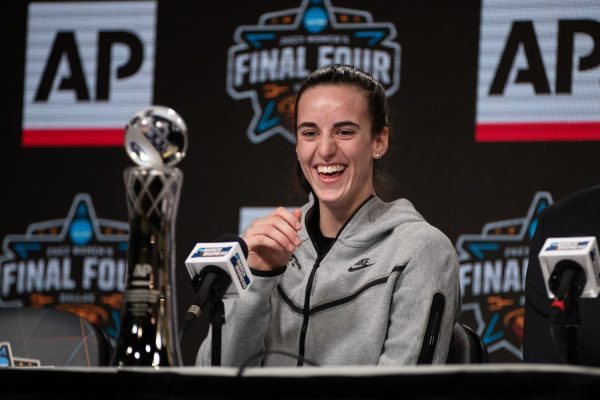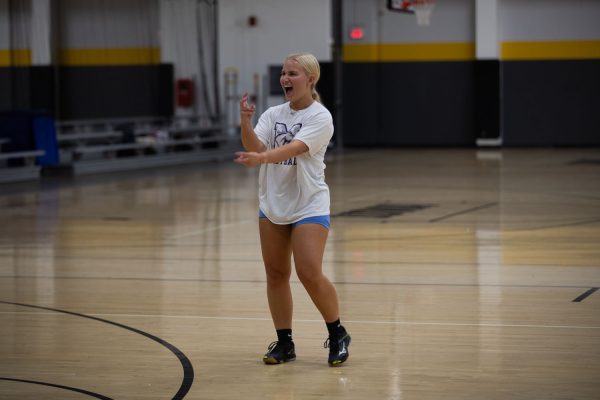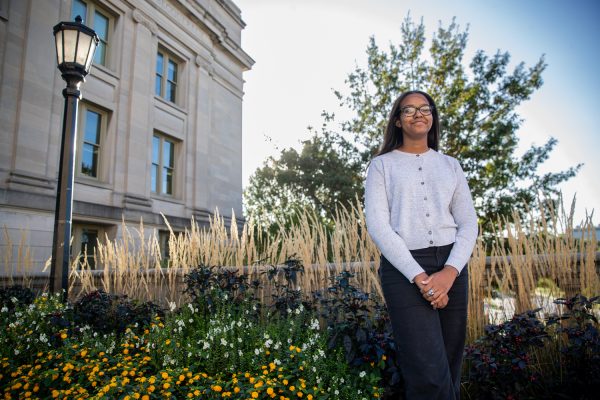First generation students find college a luxurious experience of overwhelming choices
UI students Selveyah Gamblin and Karla Sierra reflect on their experiences growing up as a first-generation student and expectations for their future.
Karla Sierra, Stands for a portrait at The Old Capitol on Sunday, 26 2023.
April 4, 2023
I once waited three hours in a very hot gym, flipping through a pamphlet to pass the time, so I could watch the 30-or-so seconds when my mother walked across the stage for a diploma. I didn’t appreciate it enough.
For some people, that moment of watching their parents receive a diploma in a hot and sweaty gym didn’t happen.
It wasn’t until I got to the University of Iowa that I met first-generation students whose parents were at varying levels of education.
First-generation students are those whose parents or legal guardians haven’t earned a four-year degree. Colleges and universities have tried to come up with more inclusive definitions, such as Brown University, which identifies first-generation students as “any student who may self-identify as not having prior exposure to or knowledge of navigating higher education institutions … and may need additional resources.”

No first-generation student is the same, but there’s a sense of community in that lived experience that can be hard to convey to those who don’t have it. At the UI, about one in five undergraduate students identify as first-generation.
In the words of UI fourth-year student Selveyah Gamblin, being a first-generation student is like learning a new language that it feels like everyone else already knows.
For Gamblin, she said her parents encouraged learning at every opportunity.
“Everything was always a learning moment. So, we’d watch a TV show, and my parents would always ask me like, ‘Oh, what do you think about that show,’” Gamblin said. “Like, how does that make you feel? Like, do you feel like you agree with the characters’ decisions in this movie?”
RELATED: Iowa Youth Writing Project filling academic gaps for area K-12 students
She said she remembers her parents bringing home different books from the library that taught her various skills and provided her with consistent encouragement to stay involved in activities.
“My goal became very early on to go to college,” Gamblin said. “Not only to make my parents proud but to be able to step into a world that otherwise I only got to see in the movies and TV shows that my parents showed me.”
This encouragement of learning didn’t necessarily mean an expectation for higher education, Gamblin said.
“The biggest thing was at least trying and testing the waters, and if it works for you … If it doesn’t, we’ll figure it out,” Gamblin said. “Their biggest hope when they were parenting was to just offer us things that they never got the chance to experience.”
Growing up, Gamblin said her ability to make her own decisions was emphasized by her family.
“It’s like for them growing up, it was about survival. It was about just finding odd jobs, paying bills, keeping a roof over your head, and now it’s to a point where they can say they’re comfortable with their children having choices, being able to choose their path,” Gamblin said.
While the choice may seem luxurious, it can also be overwhelming.
“Something that I feel like a lot of first-gen students get overwhelmed by is not having any choices, and then all of a sudden it’s like you need to choose a million things that will impact the rest of your life and your family’s lives,” Gamblin said.
The UI offers resources for first-generation students, including organizations like the First-Generation Task Force. The task force supports first-generation students and helps them succeed at the UI. The task force has over 50 faculty members and over 15 events and initiatives established.
UI third-year student Karla Sierra, another first-generation student, said she grew up comparing herself to her sibling’s education level. Before she came to the UI, Sierra already had a sibling in college.
“You’re like, okay, well, I’m not going to be the only one, one of the first generation, but my sibling is doing it too, but my sibling’s also surpassing you in terms of education level,” Sierra said.
Sierra said education was often poised as the only way out of poverty, generation cycles, and violence.
“Even to this day, my mom’s still like, I have overheard her, she’s like, ‘You need to be careful you don’t get pregnant because you’re going to leave school, when you leave school, you’re going to depend on them, and you’re going to be broke, and you’re going to be unhappy,’” Sierra said.
As a first-generation student, Sierra said she feels pressure to continue with education past undergrad to prevent doing a disservice to her family.
“My parents have always expressed it as a fear, like they’re afraid that if I take a gap year, I’ll fall in love with working or making money, or I’ll fall out of love with school,” Sierra said, “So, they’re always afraid that taking a gap year means not continuing at all.”
Sierra said her stepfather expressed interest in going back to culinary school but said it isn’t possible because of bills he has to pay.
“He still hasn’t done it, but I think it’s on my goals though, to like, get to a point in my life where I’m so financially well off that I can offer my parents some time to have the experience to go to school and do something that they wanted to do when they were young,” Sierra said.
Sierra said it makes her wonder how much her parents gave up to ensure she would have choices.
“It kind of inspires me, but it also off-puts me to
the idea of having kids anytime soon, which I feel like a lot of people who are first gen feel the same way,”
Sierra said.



